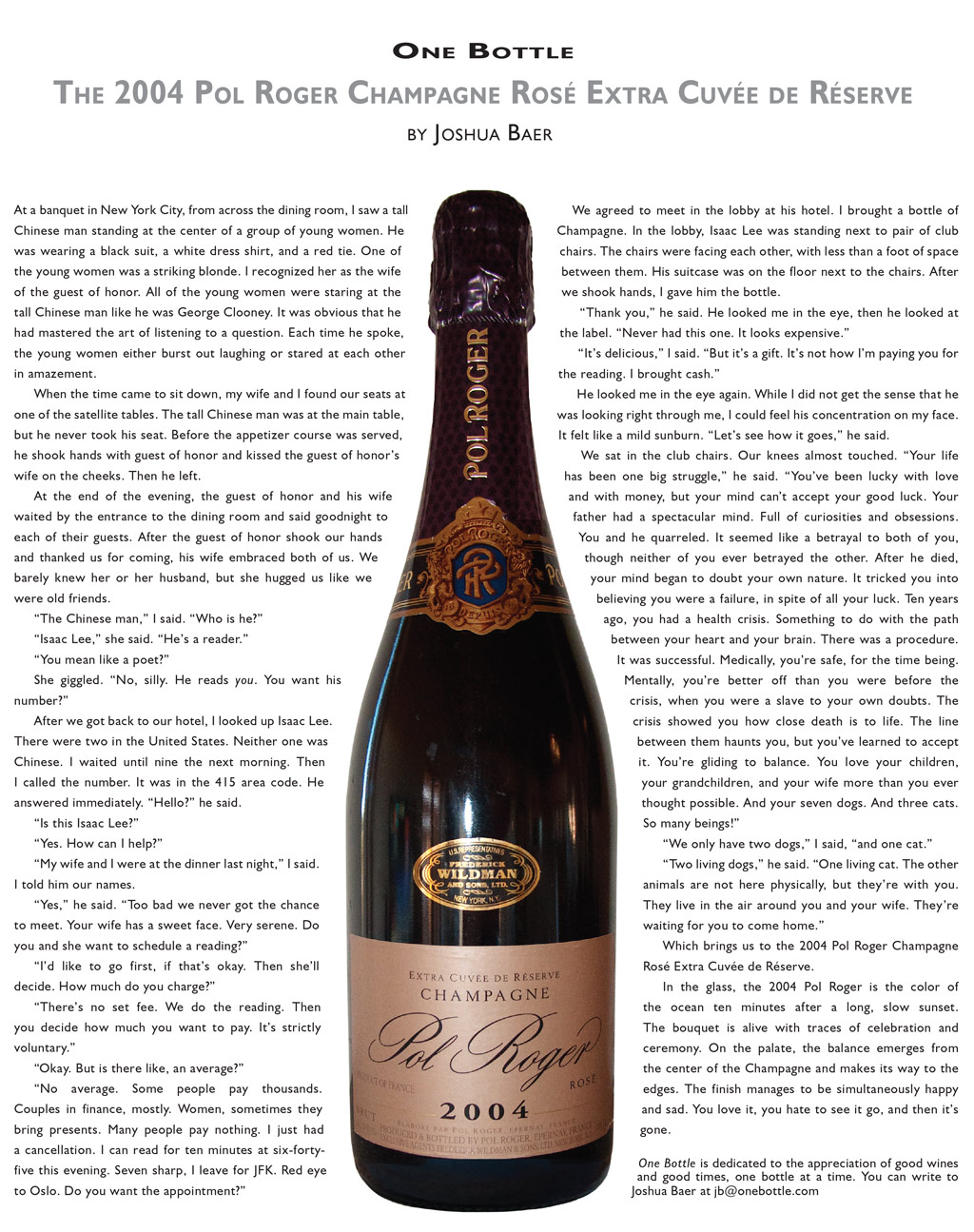2004 Pol Roger Champagne Rosé Extra Cuvée de Réserve
At a banquet in New York City, from across the dining room, I saw a tall Chinese man standing at the center of a group of young women. He was wearing a black suit, a white dress shirt, and a red tie. One of the young women was a striking blonde. I recognized her as the wife of the guest of honor. All of the young women were staring at the tall Chinese man like he was George Clooney. It was obvious that he had mastered the art of listening to a question. Each time he spoke, the young women either burst out laughing or stared at each other in amazement.
When the time came to sit down, my wife and I found our seats at one of the satellite tables. The tall Chinese man was at the main table, but he never took his seat. Before the appetizer course was served, he shook hands with guest of honor and kissed the guest of honor’s wife on the cheeks. Then he left.
At the end of the evening, the guest of honor and his wife waited by the entrance to the dining room and said goodnight to each of their guests. After the guest of honor shook our hands and thanked us for coming, his wife embraced both of us. We barely knew her or her husband, but she hugged us like we were old friends.
“The Chinese man,” I said. “Who is he?”
“Isaac Lee,” she said. “He’s a reader.”
“You mean like a poet?”
She giggled. “No, silly. He reads you. You want his number?”
After we got back to our hotel, I looked up Isaac Lee. There were two in the United States. Neither one was Chinese. I waited until nine the next morning. Then I called the number. It was in the 415 area code. He answered immediately. “Hello?” he said.
“Is this Isaac Lee?”
“Yes. How can I help?”
“My wife and I were at the dinner last night,” I said. I told him our names.
“Yes,” he said. “Too bad we never got the chance to meet. Your wife has a sweet face. Very serene. Do you and she want to schedule a reading?”
“I’d like to go first, if that’s okay. Then she’ll decide. How much do you charge?”
“There’s no set fee. We do the reading. Then you decide how much you want to pay. It’s strictly voluntary.”
“Okay. But is there like, an average?”
“No average. Some people pay thousands. Couples in finance, mostly. Women, sometimes they bring presents. Many people pay nothing. I just had a cancellation. I can read for ten minutes at six-forty-five this evening. Seven sharp, I leave for JFK. Red eye to Oslo. Do you want the appointment?”
We agreed to meet in the lobby at his hotel. I brought a bottle of Champagne. In the lobby, Isaac Lee was standing next to pair of club chairs. The chairs were facing each other, with less than a foot of space between them. His suitcase was on the floor next to the chairs. After we shook hands, I gave him the bottle.
“Thank you,” he said. He looked me in the eye, then he looked at the label. “Never had this one. It looks expensive.”
“It’s delicious,” I said. “But it’s a gift. It’s not how I’m paying you for the reading. I brought cash.”
He looked me in the eye again. While I did not get the sense that he was looking right through me, I could feel his concentration on my face. It felt like a mild sunburn. “Let’s see how it goes,” he said.
We sat in the club chairs. Our knees almost touched. “Your life has been one big struggle,” he said. “You’ve been lucky with love and with money, but your mind can’t accept your good luck. Your father had a spectacular mind. Full of curiosities and obsessions. You and he quarreled. It seemed like a betrayal to both of you, though neither of you ever betrayed the other. After he died, your mind began to doubt your own nature. It tricked you into believing you were a failure, in spite of all your luck. Ten years ago, you had a health crisis. Something to do with the path between your heart and your brain. There was a procedure. It was successful. Medically, you’re safe, for the time being. Mentally, you’re better off than you were before the crisis, when you were a slave to your own doubts. The crisis showed you how close death is to life. The line between them haunts you, but you’ve learned to accept it. You’re gliding to balance. You love your children, your grandchildren, and your wife more than you ever thought possible. And your seven dogs. And three cats.
So many beings!”
“We only have two dogs,” I said, “and one cat.”
“Two living dogs,” he said. “One living cat. The other animals are not here physically, but they’re with you. They live in the air around you and your wife. They’re waiting for you to come home.”
Which brings us to the 2004 Pol Roger Champagne Rosé Extra Cuvée de Réserve.
In the glass, the 2004 Pol Roger is the color of the ocean ten minutes after a long, slow sunset. The bouquet is alive with traces of celebration and ceremony. On the palate, the balance emerges from the center of the Champagne and makes its way to the edges. The finish manages to be simultaneously happy and sad. You love it, you hate to see it go, and then it’s gone.
One Bottle is dedicated to the appreciation of good wines and good times, one bottle at a time. You can write to Joshua Baer at jb@onebottle.com.
